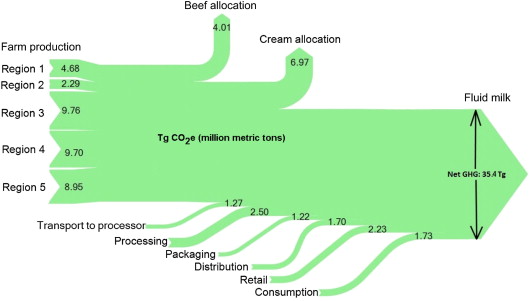Elsevier, Social Science and Medicine, Volume 84, May 2013
A growing body of literature supports stigma and discrimination as fundamental causes of health disparities. Stigma and discrimination experienced by transgender people have been associated with increased risk for depression, suicide, and HIV. Transgender stigma and discrimination experienced in health care influence transgender people's health care access and utilization. Thus, understanding how stigma and discrimination manifest and function in health care encounters is critical to addressing health disparities for transgender people.
Elsevier, International Dairy Journal, Volume 31, April 2013
This article presents a cradle-to-grave analysis of the United States fluid milk supply chain greenhouse gas (GHG) emissions that are accounted from fertilizer production through consumption and disposal of milk packaging. Crop production and on-farm GHG emissions were evaluated using public data and 536 farm operation surveys. Milk processing data were collected from 50 dairy plants nationwide. Retail and consumer GHG emissions were estimated from primary data, design estimates, and publicly available data.
Elsevier, Research Policy, Volume 42, March 2013
A considerable body of work highlights the relevance of collaborative research, contract research, consulting and informal relationships for university-industry knowledge transfer. We present a systematic review of research on academic scientists' involvement in these activities to which we refer as 'academic engagement'. Apart from extracting findings that are generalisable across studies, we ask how academic engagement differs from commercialisation, defined as intellectual property creation and academic entrepreneurship.
Elsevier, Journal of Aging Studies, Volume 27, January 2013
While we know that minority status differentiates the experience of aging, little research has been done to examine the ways in which patterns of successful aging may differ in diverse subgroups of older adults. In this exploratory study, we investigated and described experiences of successful aging in a sample of lesbian, gay, bisexual and transgender (LGBT) older adults. Directed by a community-based participatory research process, we conducted semi-structured in-depth interviews with 22 LGBT adults, age 60 and older.
Elsevier, Child Abuse and Neglect, Volume 36, September 2012
Objectives: Lesbian, gay, and bisexual (LGB) populations exhibit elevated rates of psychiatric disorders compared to heterosexuals, and these disparities emerge early in the life course. We examined the role of exposure to early-life victimization and adversity-including physical and sexual abuse, homelessness, and intimate partner violence-in explaining sexual orientation disparities in mental health among adolescents and young adults. Methods: Data were drawn from the National Longitudinal Study of Adolescent Health, Wave 3 (2001-2002), a nationally representative survey of adolescents.
Elsevier, Ophthalmology, Volume 119, April 2012
Purpose: To evaluate the efficacy and safety of intravitreal ranibizumab in diabetic macular edema (DME) patients. Design: Two parallel, methodologically identical, phase III, multicenter, double-masked, sham injectioncontrolled, randomized studies. Participants: Adults with vision loss from DME (best-corrected visual acuity [BCVA], 20/4020/320 Snellen equivalent) and central subfield thickness ≥275 μm on time-domain optical coherence tomography (OCT). Intervention: Monthly intravitreal ranibizumab (0.5 or 0.3 mg) or sham injections. Macular laser was available per-protocolspecified criteria.
Elsevier, Transport Policy, Volume 20, March 2012
The late 1990s and early 2000s witnessed a growing interest amongst UK academics and policy makers in the issue of transport disadvantage and, more innovatively, how this might relate to growing concerns about the social exclusion of low income groups and communities. Studies (predominantly in the United Kingdom) began to make more explicit the links policy between poverty, transport disadvantage, access to key services and economic and social exclusion (see for example Church and Frost, 2000; .
Elsevier, Journal of the American College of Radiology, Volume 9, July 2012
The 2011 RAD-AID Conference on International Radiology for Developing Countries discussed data, experiences, and models pertaining to radiology in the developing world, where widespread shortages of imaging services significantly reduce health care quality and increase health care disparities. This white paper from the 2011 RAD-AID conference represents consensus advocacy of multidisciplinary strategies to improve the planning, accessibility, and quality of imaging services in the developing world.

